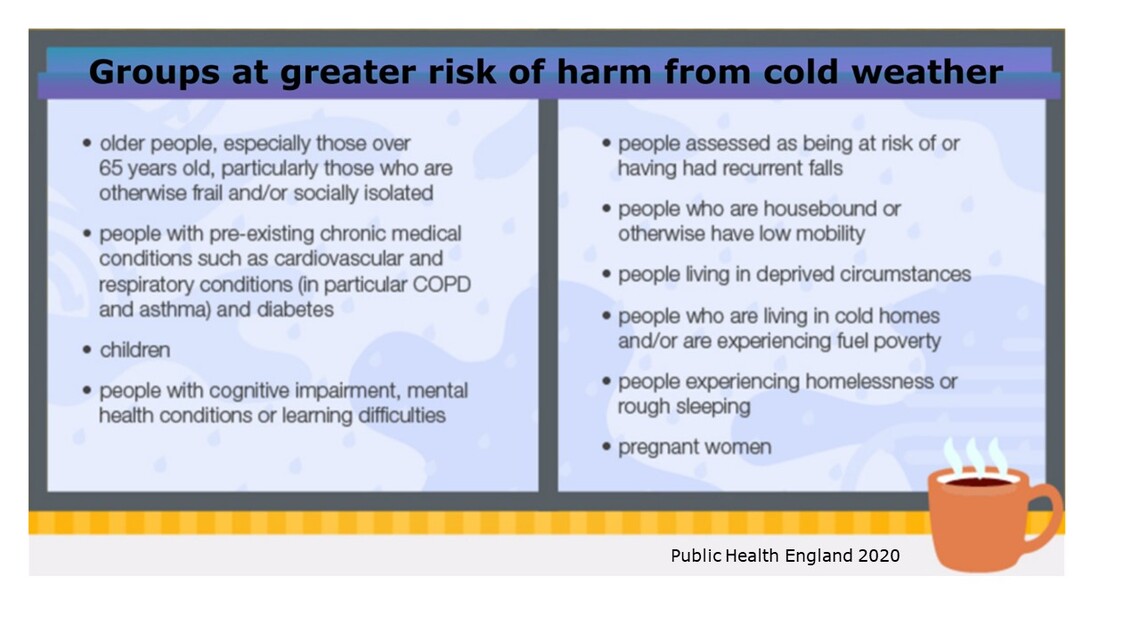Can deliberate exposure to the cold have a positive effect on the ageing process? This article sets out some of the benefits of exposure to the cold and some of the evidence supporting those benefits.
- Health risks of cold weather
- The benefits of ‘hormesis’
- The evidence – so far
- The importance of agency
- Conclusion
Many of us have been taught to avoid the cold. Being cold can feel uncomfortable and can put a strain on our body’s systems. Winter is always a challenging time for health services, and there are always more excess deaths in the winter than there are in the warmer months. As well as the significant rise in deaths, the winter period also sees a substantial increase in illnesses. The reasons for this are complex and interlinked, but cold homes are a key factor.
There is also a range of other health risks that are associated with cold weather.

Benefits of hormesis
|
Hormesis refers to exposure to a stressor that could be harmful when the exposure is intense and long, but may be beneficial when the exposure is light and short. ‘That which does not kill us makes us stronger.’ (Friedrich Nietzsche) |
There seems to be some evidence that managed exposure to the cold can be beneficial. For example, a stressor such as taking a cold shower is one way to experience hormesis, but it is not only exposure to the cold that offers the opportunity to experience hormesis, intense exercising and fasting are also examples of stressing the body. In the short term, these stressors can lead to long-term health benefits. By deliberately provoking the stress response to such stressors, the ability of our body to repair itself and age healthily remains stronger. (Frank Lipman and Danielle Claro, The New Rules of Aging Well, New York, Artisan, 2020)
Crucially, for hormesis to be beneficial, exposures to stressors should be mild and periodic, not chronic and overwhelming. Low exposure or low ‘doses’ can improve our bodily and mental functions, whereas higher doses can lead to dysfunction.
The evidence – so far
Health-enhancing effects
Scientific evidence for the benefits of cold-water exposure is still being gathered and more research is still needed, as Dr Michael Mosley discusses in a BBC podcast. However, there are signs that exposure to cold has a health-enhancing effect. In a randomised controlled study in the Netherlands, researchers found that those who took a cold shower every morning showed a 29% reduction in self-reported sick leave from work.
Habituation
One scientist believes that the habituation response to the cold, as well as being anti-inflammatory, may also be transferrable to other stressors in life.
Depressive disorder
One 2018 study examined whether open-water swimming could be an effective treatment for major depressive disorder. A 24-year-old woman, Sarah, with symptoms of major depressive disorder and anxiety had been treated for the condition since the age of 17 and was taking medication. She participated in a programme of weekly open-water swimming which led to an immediate improvement in her symptoms after each swim, and a long-term tapering off, and eventual ending, of her medication. Further empirical research is needed to understand the exact mechanisms at work here, but the researchers suggest that being in nature, developing friendships and the sense of achievement gained through overcoming challenging tasks could all have a positive effect on mental health.
Sense of achievement
Perhaps this sense of being able to complete challenging tasks is a key feature of healthy ageing. When Sarah was asked how she felt during one of the swims she replied, ‘on top of the world’, and when asked why, she replied, ‘I’ve done what I came out to do’.
This suggests that intentionally exposing ourselves to more challenging tasks can result in a strong sense of satisfaction and achievement.
The importance of agency
|
Voluntarily overcoming challenging tasks can foster a sense of agency and create a feeling of ‘being in the driving seat when it comes to our actions’. |
It appears that our sense of agency decreases as we get older. When asked whether they agreed or disagreed with the statement “What happens in my life is beyond my control”, 62% of older adults disagreed, compared with 80% of younger adults (25–39 years old). The older adults had a lower sense of their ability (their agency) to control their life.
If further research suggests that cold-water swimming does indeed foster a sense of agency, it could be to the benefit of more people to take part to promote healthier ageing. Research has shown that a reduction in a sense of agency, which occurs most rapidly between the ages of 60 and 80 years, is associated both with poor health and with a reduction in quality of life.
Conclusion
There are promising signs that the physiological and mental benefits of exposure to cold could help promote healthy ageing, but further research is needed to realise its potential.
William Bate August 2021
_________________________
Another relevant article on the Age Watch website:
Ageing: Cold weather health risks
